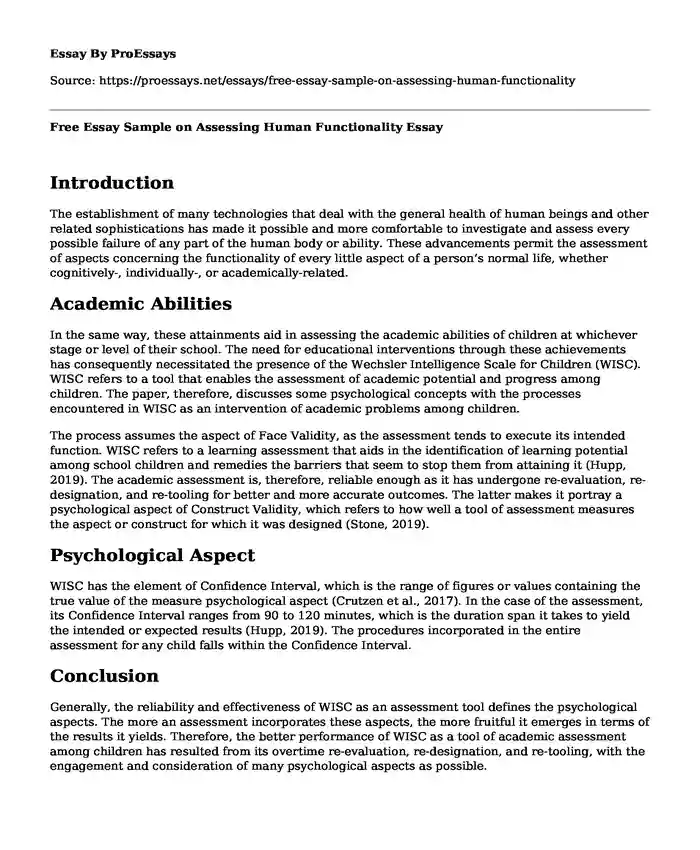Introduction
The establishment of many technologies that deal with the general health of human beings and other related sophistications has made it possible and more comfortable to investigate and assess every possible failure of any part of the human body or ability. These advancements permit the assessment of aspects concerning the functionality of every little aspect of a person’s normal life, whether cognitively-, individually-, or academically-related.
Academic Abilities
In the same way, these attainments aid in assessing the academic abilities of children at whichever stage or level of their school. The need for educational interventions through these achievements has consequently necessitated the presence of the Wechsler Intelligence Scale for Children (WISC). WISC refers to a tool that enables the assessment of academic potential and progress among children. The paper, therefore, discusses some psychological concepts with the processes encountered in WISC as an intervention of academic problems among children.
The process assumes the aspect of Face Validity, as the assessment tends to execute its intended function. WISC refers to a learning assessment that aids in the identification of learning potential among school children and remedies the barriers that seem to stop them from attaining it (Hupp, 2019). The academic assessment is, therefore, reliable enough as it has undergone re-evaluation, re-designation, and re-tooling for better and more accurate outcomes. The latter makes it portray a psychological aspect of Construct Validity, which refers to how well a tool of assessment measures the aspect or construct for which it was designed (Stone, 2019).
Psychological Aspect
WISC has the element of Confidence Interval, which is the range of figures or values containing the true value of the measure psychological aspect (Crutzen et al., 2017). In the case of the assessment, its Confidence Interval ranges from 90 to 120 minutes, which is the duration span it takes to yield the intended or expected results (Hupp, 2019). The procedures incorporated in the entire assessment for any child falls within the Confidence Interval.
Conclusion
Generally, the reliability and effectiveness of WISC as an assessment tool defines the psychological aspects. The more an assessment incorporates these aspects, the more fruitful it emerges in terms of the results it yields. Therefore, the better performance of WISC as a tool of academic assessment among children has resulted from its overtime re-evaluation, re-designation, and re-tooling, with the engagement and consideration of many psychological aspects as possible.
References
Crutzen, R., Peters, G. J. Y., & Noijen, J. (2017). Using confidence interval-based estimation of relevance to select social-cognitive determinants for behavior change interventions. Frontiers in public health, 5, 165. https://www.frontiersin.org/articles/10.3389/fpubh.2017.00165/full
Hupp, S. (Ed.). (2019). Pseudoscience in child and adolescent psychotherapy: a skeptical field guide. Cambridge University Press.
https://www.melbournechildpsychology.com.au/blog/wisc-v-assessments-for-improving-your-childs-learning-potential-part-1/
Stone, C. (2019). A Defense and Definition of Construct Validity in Psychology. Philosophy of Science, 86(5), 1250-1261.
https://www.journals.uchicago.edu/doi/abs/10.1086/705567?journalCode=phos.
Cite this page
Free Essay Sample on Assessing Human Functionality. (2023, Nov 25). Retrieved from https://proessays.net/essays/free-essay-sample-on-assessing-human-functionality
If you are the original author of this essay and no longer wish to have it published on the ProEssays website, please click below to request its removal:
- Implementation of Public Health Campaign: Timeline/Milestones and Marketing Strategies
- Paper Example on Alzheimer in the Form of Its Pathophysiology
- Health Professional's Dilemmas Essay Example
- Leadership in Education: Understanding Impact & Administration for Student Success
- Essay Example on Humans' Enduring Pursuit of Problem-Solving Through Innovation and Creativity
- 5G Networks & Coronavirus: Debunking the Unfounded Conspiracy Theories - Essay Sample
- Essay Example on Coronavirus: Impact on Ethnicity & Cultural Diversity?







